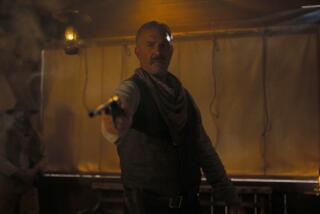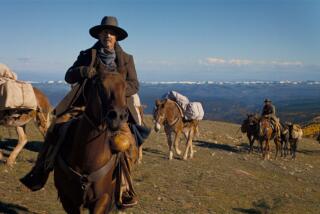North to Alaska in Dave Eggers’ new ‘Heroes of the Frontier’
- Share via
Among his bestselling literary fiction peers, Dave Eggers alone is engaged in a sustained effort to write about contemporary America. He’s been going at it so regularly, and so swiftly, that he’s keeping pace with the times, if not getting a half-step ahead. Perhaps he knows what’s next for us: In “Heroes of the Frontier,” his protagonist Josie runs off to Alaska after her life falls apart.
Josie used to be a dentist, but isn’t really anymore; she used to be in love with Carl, the father of her children, but now she recalls him with loathing. He was too whimsical to get married and told her he was against the very idea of marriage – but after their split, he got engaged and wants their kids to come to his wedding.
This precipitated her Alaskan escape. She “was fully justified in leaving,” she rationalizes on the book’s second page. “Carl had no idea she had taken the children out of Ohio. Almost out of North America. And he could not know,” she says a little later.
And so it begins: A woman has absconded with her children, and we are on her side – even while realizing, at some level, that this is an uncomfortable place to be.
For most of the book, we travel along with Josie in a precarious rented RV that she dryly calls the Chateau. On board she has 8-year-old Paul, 3-year-old Ana, too much wine and an abundance of self-recriminating thoughts.
‘Heroes’ gives us a woman who’s at the end of her rope, in a place of salvation without the wherewithal to seek it, as its promise goes up in flames.
— Carolyn Kellogg on Dave Eggers’ ‘Heroes of the Frontier’
There is a destination of sorts – her sister’s place, but it’s not exactly her sister, and she won’t be around for a few days yet. So Josie drifts from one overpriced campground to another, or worse yet, random roadsides, inattentive to the people she meets, failing to be moved by the landscape’s arresting beauty.
“Where was the Alaska of magic and clarity?” she wonders. “This place was choked with the haze of a dozen forest fires, spread around the state like a prison break.”
This is the stuff of hyperbolic nightmare: America’s largest, northernmost state, with a subarctic climate, its forests in flames. But in 2015 that did happen, with more than 5 million acres – an area as large as Massachusetts – lost to wildfires.
If Alaska can’t remain safe from fires, and if Josie can’t help steering toward that danger, what hope is there for her, for us? When Eggers draws the present into his fiction, it’s there not just as window dressing or setting; it tells us something about ourselves.
In 2014, Eggers published the challenging, didactic novel “Your Fathers, Where Are They? And the Prophets, Will They Live Forever?” The book was a series of dialogues about America’s failures – wars, police brutality – that took place between a troubled man and the people he kidnapped. It was not much of a people-pleaser.
But its predecessor, the 2013 bestseller “The Circle,” was. It featured a young woman who went to work at a Silicon Valley behemoth who gamely shaped herself to become a star of its always-connected selfie- and social-media-sharing- culture. A film version, starring Emma Watson with Tom Hanks, John Boyega and Patton Oswalt, is due later this year.
It’s bound to fare better than the adaptation that came and went this spring of “A Hologram for the King,” Eggers’ 2012 novel of an aging executive (played by Hanks) who (after exporting his business to extinction) has one last shot to start over by selling irrelevant technology to Saudi royalty. The book was a successful, melancholy meditation on America’s lost manufacturing base, the erosion of a shared sense of national purpose, and one middle-class man left adrift.
Work, politics, the end of America as an economic powerhouse. And now a woman who’s at the end of her rope, in a place of salvation without the wherewithal to seek it, as its promise goes up in flames.
Josie keeps turning, despite herself, toward those fires. Even when guided by authorities, in a slapstick episode that becomes terrifying, she winds up going the wrong way. The children are sleeping and there’s nothing to do but drive on: The idea of pursuit by her ex is a greater danger than the fires to the north.
Yes, this is a terrible decision, she is full of them. To avoid using any traceable cards, she’s living off a bag of cash she’s stashed under the RV’s sink. When she meets up with someone who offers her kindness, she drinks too much, acts out or pushes off in a hurry -- usually some combination of the three. She takes things she shouldn’t. Disaster is only a hairbreadth away. She makes so many bad choices, you half expect her to point to Christopher McCandless’ bus and say, “Hey kids, that’s our destination!”
But this is not “Into the Wild,” thankfully. She doesn’t have a grand narrative goal, like McCandless or Don Quixote or Odysseus or Dante. Instead, she’s driven by a nagging restless dissatisfaction – one that’s very human.
“She could be content, and could do her work, or feed her children, or temporarily love a man like Carl, and live in the town she lived in, in the country she’d been born in,” she realizes in a buzzy reverie, “but a thousand other lives presented themselves to her daily and seemed equally or more worthwhile.”
This, of course, is the story of her trying to choose another life, an act that’s harder than it seems. She’s wrestling with a past -- full of pain, anger, guilt and stifled flights of fancy – that is slowly revealed.
And she’s a loving parent, but almost criminally free-range. She allows her hyper-vigilant son and tiny terror of a daughter to fend for themselves. They are better at taking care of her, and of each other, than she is of them. It’s something Eggers deftly lets us see around the edges of Josie’s world.
But it takes a while to reach that point. On the first page, Josie sees herself in her own “personal slum,” and the language is so harsh that it’s hard to tell what we’re supposed to think of her. Eggers takes a little too long before giving us the tools to understand that he’s not looking down on her, that the criticisms come from Josie.
Funny, sharp and exasperated with everyone -- especially herself -- she can be a relentless narrative companion. When relief comes, it’s not really nature that’s the balm – although it helps – but a combination of solitude, other grown-ups and the act of creation. To grow, Josie has to connect.
And the landscape does reveal some healing powers. How could it not? On fire or not, it’s America’s last great unspoiled, untamed wilderness. If there is no hope for Josie and her children there, there is no hope for any of us.
::
Dave Eggers
Knopf: 400 pp., $28.95
More to Read
Sign up for our Book Club newsletter
Get the latest news, events and more from the Los Angeles Times Book Club, and help us get L.A. reading and talking.
You may occasionally receive promotional content from the Los Angeles Times.








